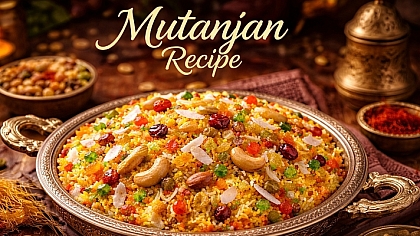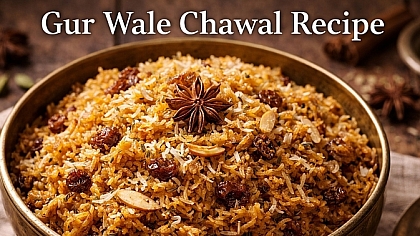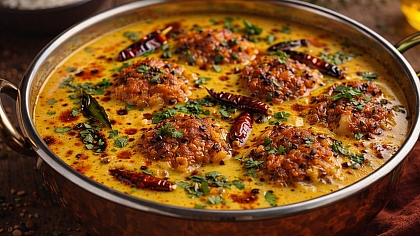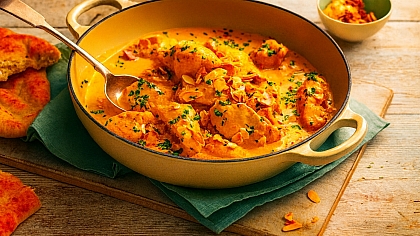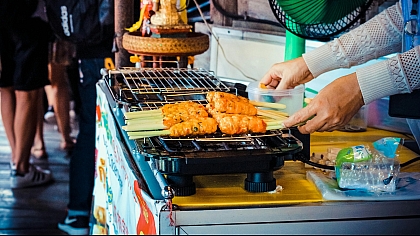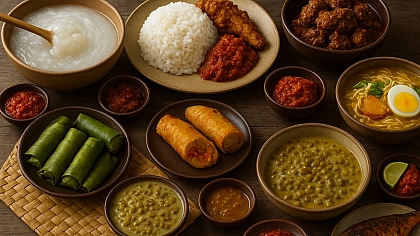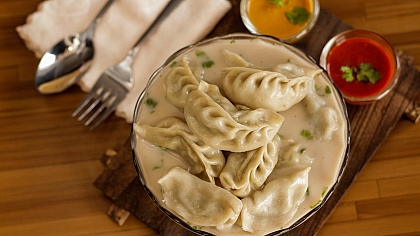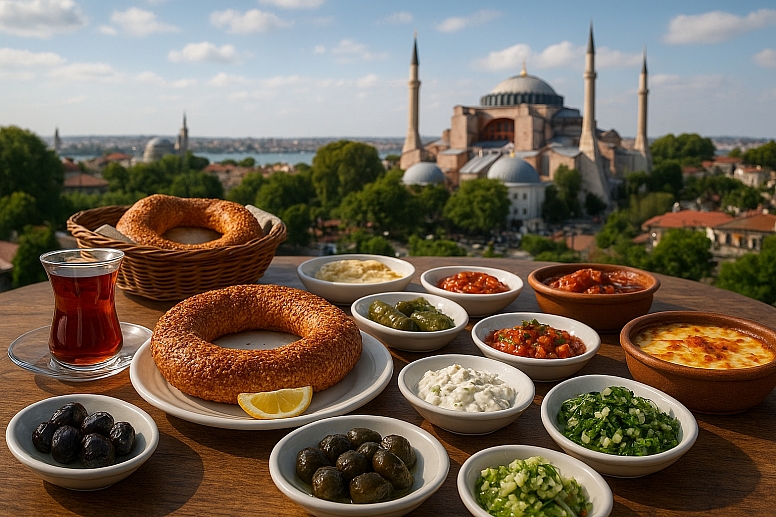
The Ultimate Turkish Food Road Trip Across Istanbul & Cappadocia
Imagine cruising through Turkey's breathtaking countryside, windows down, catching whiffs of fresh bread from village bakeries. You pull over for a warm simit from a roadside vendor, stumble upon a hidden meze spot, and taste recipes that grandmothers have been perfecting for generations. Here's the thing about Turkish food: it's not just about filling your stomach. It's about diving headfirst into centuries of history, culture, and pure culinary passion.
Get this: Istanbul became the world's most-visited city in 2023, welcoming over 17 million international travelers that year. That massive number? It's proof that food enthusiasts worldwide already know what you're about to discover: Turkey's food scene is absolutely mind-blowing.
Istanbul: Your Plate Becomes a Cultural Bridge
Ready to explore? Istanbul's diverse neighborhoods turn every street corner into your next flavor revelation.
The Historic Peninsula: Ottoman Recipes Still Alive Today
Walking through the Historic Peninsula feels like time travel with benefits. Those traditional kebab houses near the Blue Mosque? They're still using recipes their great-great-grandfathers perfected. And here's a pro tip: when you're hunting down those incredible hidden gems, staying connected becomes crucial. An eSIM for Turkey will keep you linked to food apps and navigation tools that'll lead you straight to culinary gold.
These cobblestone streets hide breakfast spots where locals start their day right. Picture this: creamy kaymak, fresh beyaz peynir, perfectly ripe tomatoes, all paired with that strong Turkish tea. Family establishments that have been serving the same neighbors for decades.
The Grand Bazaar area? It's riddled with intimate meze bars where stuffed grape leaves and smoky baba ganoush await your discovery.
Those street vendors around Eminönü selling döner and iconic simit rings aren't trying to rip off tourists; they're the real deal. Places that have been perfecting their craft longer than most restaurants have existed.
Galata and Beyoğlu: Where Tradition Gets a Modern Makeover
Cross the Golden Horn and you'll find yourself in completely different culinary territory.
Galata and Beyoğlu represent Turkey's food evolution in real time. Innovative restaurants here take grandma's recipes and give them contemporary twists that'll make your taste buds do backflips. Craft cocktail bars serve rakı-based drinks with uniquely Turkish elements. Artisanal coffee roasters have transformed Turkish coffee into something almost revolutionary.
Karaköy district buzzes with contemporary street food vendors who respect tradition while embracing innovation. Young Turkish chefs experiment fearlessly, but they never forget where their flavors come from.
Kadıköy on the Asian Side: Where Real Istanbul Eats
Want to know where actual locals eat? Away from tourist crowds? Cross the Bosphorus. Kadıköy's markets overflow with ingredients that define authentic Turkish cooking. Those famous fish sandwich boats at Eminönü serve some of Istanbul's most beloved street food. These floating restaurants grill fresh fish, serve it in bread with pickled vegetables and onions, creating magic.
Family-run lokanta restaurants here dish out home-style meals at prices that'll shock you in the best way. Plus, traditional baklava workshops where craftsmen layer phyllo dough so thin it's practically edible art.
Cappadocia's Food Scene: Ancient Underground, Amazing Above
After Istanbul's urban food adventure, hitting the road reveals how dramatically Turkey's culinary landscape shifts inland.

Göreme Valley: Dining in Fairy Chimneys
Cappadocia cuisine mirrors the region's volcanic landscape and ancient roots. Cave restaurants carved directly into fairy chimneys offer dining experiences that exist nowhere else on earth. Picture eating traditional Anatolian dishes surrounded by stone walls that have witnessed centuries.
Hot air balloon breakfast packages combine sunrise views with hearty Turkish morning spreads. Floating above otherworldly landscapes while sipping Turkish tea, then landing for fresh gözleme and local honey.
Local vineyard tours reveal wine-making traditions spanning thousands of years. That volcanic soil creates distinctive flavors in grapes and the region's famous pottery kebab dishes.
Pottery Kebab: Cappadocia's Culinary Theater
Beyond Göreme's dramatic venues, neighboring towns like Avanos and Ürgüp showcase food crafts still practiced exactly as they were centuries ago.
Testi kebab represents Cappadocia's ultimate culinary spectacle. Meat and vegetables slow-cook in sealed clay pots until servers dramatically crack them open at your table. The clay adds earthy flavors impossible to achieve any other way.
Cave-aged cheeses develop complex flavors in natural underground storage systems. Local producers craft unique dried fruit and nut combinations using preservation methods passed down through generations.
Turkey's Street Food: Your Mobile Feast Adventure
Restaurants showcase regional specialities beautifully, but Turkey's street food culture delivers equally authentic experiences at wallet-friendly prices.
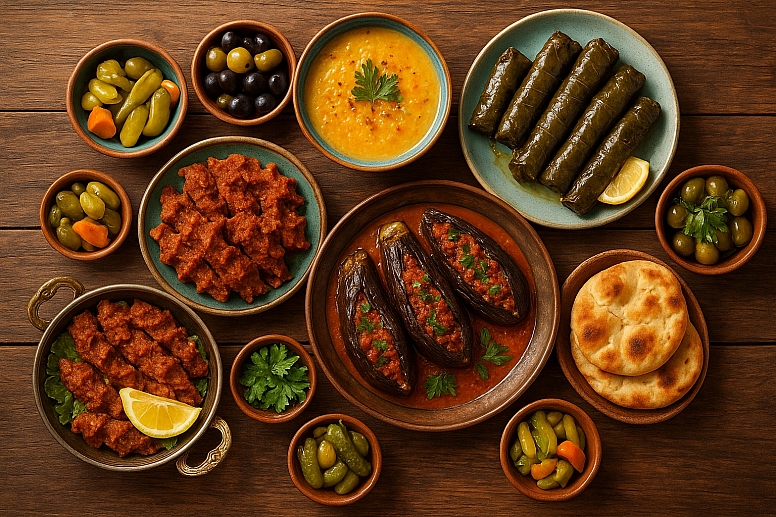
Istanbul's Street Food Rhythm
Street food in Turkey follows fascinating daily patterns. Early mornings bring simit vendors and tea sellers targeting commuters. Those circular bread rings with sesame seeds pair perfectly with Turkish tea served in traditional tulip-shaped glasses.
Lunch transforms streets with döner stands and durum wrap vendors everywhere. Afternoons introduce balık ekmek culture around Galata Bridge, where boat vendors serve fresh-grilled fish with bread and vegetables. Here's an impressive fact: Türkiye ranks as the world's second-largest olive oil producer, explaining why even simple street preparations taste incredible.
Late evenings get adventurous with kokoreç and midye dolma that challenge timid palates but reward food explorers willing to take risks.
Cappadocia's Rural Food Rhythm
Cappadocia's street food operates on completely different rhythms shaped by rural traditions and seasonal cycles.
Village market days bring specialty vendors with local produce and prepared foods. Traditional breakfast carts appear in town squares serving fresh bread, local cheeses, and seasonal preserves. Festival celebrations feature street foods reflecting nomadic heritage.
Fine Dining: Turkish Cuisine Gets Sophisticated
Beyond neighborhood gems, Istanbul's upscale dining rivals any European capital for elevated Turkish experiences.
Award-Winning Establishments
Best Turkish restaurants blend traditional techniques with modern presentation flawlessly. Rooftop venues offer stunning Bosphorus views alongside creative Ottoman cuisine interpretations. Chef-owned establishments showcase regional specialties through tasting menus that narrate Turkey's culinary story.
Wine pairing experiences feature Anatolian varieties complementing Turkish flavors perfectly. These sophisticated venues prove Turkish cuisine deserves recognition alongside world-class culinary traditions.
Regional Taste Comparison
|
Region |
Signature Dish |
Key Ingredients |
Dining Style |
|
Istanbul |
Döner Kebab |
Lamb, bread, and vegetables |
Street food/casual |
|
Cappadocia |
Testi Kebab |
Meat, vegetables, and a clay pot |
Traditional/ceremonial |
|
Aegean Coast |
Zeytinyağlı |
Olive oil, vegetables |
Mediterranean/healthy |
|
Southeast |
Lahmacun |
Minced meat, herbs, flatbread |
Spicy/regional |
Timing matters tremendously when chasing specific dishes across Turkey's diverse regions. Spring brings wild green foraging traditions and early fruit preparations. Summer delivers peak fruit seasons and refreshing cold dishes perfect for hot weather. Autumn celebrates grape harvests and preserved food preparations. Winter warms hearts with hearty soups and comfort foods that have sustained Turkish families through countless generations.
Your Turkish Culinary Adventure Awaits
This food road trip across Istanbul and Cappadocia delivers more than meals—it's a complete cultural immersion through taste. From bustling Istanbul food tour experiences to intimate Cappadocian cave dinners, every single bite narrates Turkey's incredible story. Each region contributes unique flavors, techniques, and traditions, creating one of earth's greatest cuisines. Don't just visit Turkey; taste it completely, experience it fully, and let its remarkable food culture transform how you understand this extraordinary crossroads between Europe and Asia.
Essential Questions for Your Food Journey
What dishes should food newcomers prioritize?
Start with döner kebab, Turkish breakfast (kahvaltı), baklava, and Turkish tea. These represent Turkey's core flavors, and you'll find authentic versions everywhere.
What's a realistic daily food budget for road tripping?
Budget $15-25 daily for excellent eating experiences. Street food runs $2-5 per meal, restaurant dining ranges $8-15. Fine dining experiences cost $25-50 per person.
Can I find authentic food outside major tourist zones?
Absolutely! Rural areas often provide more authentic experiences at better prices. Village restaurants and local markets offer genuine Turkish hospitality with traditional recipes unchanged for generations.

